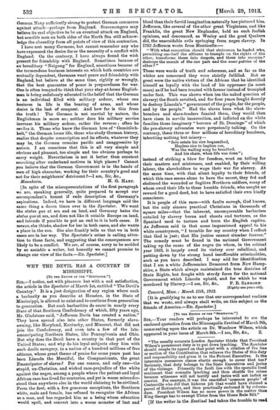WHY THE DEVIL HAS A COUNTRY IN MISSISSIPPI.
[To THE EDITOR OF THE "SPECTATOR.] SIE,-I notice, not with pleasure but with a sad satisfaction, the article in the Spectator of March 1st, entitled "The Devil's Country." It is a just designation of any region where such a barbarity as you describe at Houston, in the State of Mississippi, is allowed to exist and to continue from generation to generation. But such barbarities do occur in nearly every State of that Southern Confederacy of which, fifty years ago, Mr. Gladstone said, "Jefferson Davis has created a nation." They have spread also into other States, formerly slave- owning, like Maryland, Kentucky, and Missouri, that did not join the Confederacy, and even into a few of the late- emancipating Northern States, like Pennsylvania and Ohio. But why does the Devil have a country in that part of the United States; and why do his loyal subjects obey him with such docile savagery, in a nation of a hundred millions of free citizens, whose great theme of praise for some years past has been Lincoln the Merciful, the Compassionate, the great Emancipator of slaves P For one reason, and only one—the stupid, un-Christian, and wicked race-prejudice of the white against the negro, among a people where the patient and loyal African race has lived for centuries, and yet is worse misunder- stood than anywhere else in the world claiming to be civilized. From the first, with a few generous exceptions, the Southern white, male and female, has refused to recognize the African as a man, and has regarded him as a being whom education would spoil, and convert into a worse monster of lust and blood than their fervid imagination naturally has pictured him. Jefferson, like several of the other great Virginians, and like Franklin, the great New Englander, held no such foolish opinions, and denounced, as Wesley and the good Quakers did, the unavoidable evils springing from negro slavery. In 1782 Jefferson wrote from Monticello:— " With what execration should that statesman be loaded who, permitting one-half the citizens to trample on the rights of the other, transforms those into despots, and these into enemies? destroys the morals of the one part and the autor patriee of the other ? "
These were words of truth and soberness, and so far as the whites are concerned they were strictly fulfilled. But so great were the native virtues of the African that he identified himself as loyally with the land of his oppressor (in most cases) as if he had been treated with favour instead of trampled under foot. This was shown when (on the naked question of slavery) the South revolted, and for four years fought fiercely to destroy Lincoln's "government of the people, for the people, and by the people." Had the slaves been what the slave- breeders and slave-traders fancied them, they would then have risen in servile insurrection, and inflicted on the white families those imaginary "horrors of St. Domingo" of which the pro-slavery advocates were perpetually talking. On the contrary, these three or four millions of hereditary bondmen, inheriting nothing but misery-
" Sole estate his sire bequeathed, Hapless sire to hapless son,
Was the wailing song he breathed, And his chain, when life was done";
instead of striking a blow for freedom, went on toiling for their masters and mistresses, and enabled, by their willing labour, the slaveholders to wage their war for slavery. At the same time, with that silent loyalty to their friends, of which this race seems alone to have the secret, they fed and sheltered the wounded or fugitive Northern soldiers, many of whom owed their life to these humble friends, who sought no reward for a good deed, but to have satisfied their own kindly conscience.
It is people of this race—with faults enough, God knows, but the only sincere practical Christians in thousands of square miles—that the inherent, unconquerable barbarism entailed by slavery burns and shoots and tortures, as the Spaniard used to torture and burn the English captive. As Jefferson said in that same impassioned appeal to his white countrymen, "I tremble for my country when I reflect that God is just; that His justice cannot slumber forever." The remedy must be found in the national Government taking up the cause of the negro (to whom, in the critical year 1863, it largely owed its victory over rebellion), and putting down by the strong hand insufferable critninalities, such as you have described. I may add for identification that I am a white Jeffersouian Democrat from New Hamp- shire, a State which always maintained the true doctrine of State Rights, but fought with sturdy force for the national Government which Lincoln upheld, and for which he was
murdered by Slavery.—I am, Sir, &c., F. B. SANBORN Concord, Mass. : March 15th, 1913. (Eighty-one years old).
[It is gratifying to us to see that our correspondent realizes that we wrote, and always shall write, on this subject as the friends of America.—En. Spectator]










































 Previous page
Previous page